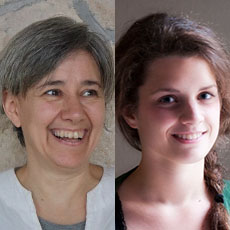Hungarian Aphasia Choir Coping Online During the COVID-19 Pandemic
DOI :
https://doi.org/10.15845/voices.v22i1.3337Mots-clés :
aphasia choir, community music therapy, singing, online, pandemicRésumé
Aphasia choirs have been gaining more and more attention for the last decade. The operation of these are based on two pillars: the therapeutic effect of singing with aphasia and decreasing the social isolation of clients with a verbal language disorder. The aim of this article is to draw attention to the international community of these choirs, with special focus on the Hungarian Aphasia Choir, and show their challenges resulting from the restrictions imposed by the SARS-CoV-2 pandemic. The Hungarian Aphasia Choir has had their therapeutic rehearsals online for seven months. The participants’ experiences and their coping methods regarding online and offline choir sessions were examined by an online survey of five questions completed by thirteen choir members living with aphasia as well as some of their caregivers. The responses clearly show the choir members’ general desire to carry on offline rehearsals, while the results also demonstrate that online rehearsals are effective in decreasing social isolation.
Références
Ansdell, G. (2002). Community music therapy and the winds of change. Voices: A World Forum for Music Therapy, 2(2 SE-Essays). https://doi.org/10.15845/voices.v2i2.83
Fogg, L., & Talmage, A. (2011). The CeleBRation Choir: Establishing community group choral singing for people living with neurological conditions. Psychomusicology: Music, Mind and Brain, 21(1–2), 264–267. https://doi.org/10.1037/h0094030
Jones, B., Bernstein-Ellis, E., Mahendra, N., & Rose, M. (2013). Aphasia Choirs go global: An international survey comparing structure, goals and outcome measures. Poster. ASHA Annual Convention. http://works.bepress.com/nidhi-mahendra/97/
Leonardi, S., Cacciola, A., De Luca, R., Aragona, B., Andronaco, V., Milardi, D., Bramanti, P., & Calabrò, R. S. (2018). The role of music therapy in rehabilitation: Improving aphasia and beyond. International Journal of Neuroscience, 128(1), 90–99. https://doi.org/10.1080/00207454.2017.1353981
Mantie-Kozlowski, A., Mantie, R., & Keller, C. H. (2018). Enjoyment in a recreational sing-along group for people with aphasia and their caregivers. Aphasiology, 32(5), 518–537. https://doi.org/10.1080/02687038.2018.1427208
Monroe, P., Halaki, M., Kumfor, F., & Ballard, K. J. (2020). The effects of choral singing on communication impairments in acquired brain injury: A systematic review. International Journal of Language and Communication Disorders, 55(3), 303–319. https://doi.org/10.1111/1460-6984.12527
Pike, C., Kritzinger, A., & Pillay, B. (2017). Social participation in working-age adults with aphasia: An updated systematic review. Topics in Stroke Rehabilitation, 24(8), 627–639. https://doi.org/10.1080/10749357.2017.1366012
Procter, S. (2001). Empowering and Enabling. Voices: A World Forum for Music Therapy, 1(2 SE-Essays). https://doi.org/10.15845/voices.v1i2.58
Schlaug, G. (2015). Melodic Intonation Therapy. In G. Hickok, S. L. Small (Ed.), Neurobiology of Language (pp. 1015–1023). Elsevier Inc. https://doi.org/10.1016/B978-0-12-407794-2.00081-X
Schlaug, G., Norton, A., Marchina, S., Lauryn, Z., & Wan, C. Y. (2010). From singing to speaking: Facilitating recovery from nonfluent aphasia. Future Neurology, 5(5), 657–665. https://doi.org/10.2217/fnl.10.44
Shadden, B. B. (2005). Aphasia as identity theft: Theory and practice. Aphasiology, 19(3–5), 211–223. https://doi.org/10.1080/02687930444000697
Sparks, R., Helm, N., & Albert, M. (1974). Aphasia rehabilitation resulting from melodic intonation therapy. Cortex, 10(4), 303–316. https://doi.org/10.1016/S0010-9452(74)80024-9
Steele, M. (2016). How can music build community? Insight from theories and practice of community music therapy. Voices: A World Forum for Music Therapy, 16(2 SE-Position Papers). https://doi.org/10.15845/voices.v16i2.876
Stige, B., & Aarø, L. E. (2011). Invitation to Community Music Therapy. Routledge. https://doi.org/10.4324/9780203803547
Tamplin, J., Baker, F. A., Jones, B., Way, A., & Lee, S. (2013). “Stroke a chord”: The effect of singing in a community choir on mood and social engagement for people living with aphasia following a stroke. NeuroRehabilitation, 32(4), 929–941. https://doi.org/10.3233/NRE-130916
Tarrant, M., Carter, M., Dean, S. G., Taylor, R., Warren, F. C., Spencer, A., Adamson, J., Landa, P., Code, C., Backhouse, A., Lamont, R. A., & Calitri, R. (2021). Singing for people with aphasia (SPA): Results of a pilot feasibility randomised controlled trial of a group singing intervention investigating acceptability and feasibility. BMJ Open, 11(1), 1–12. https://doi.org/10.1136/bmjopen-2020-040544
Tarrant, M., Warmoth, K., Code, C., Dean, S., Goodwin, V. A., Stein, K., & Sugavanam, T. (2016). Creating psychological connections between intervention recipients: Development and focus group evaluation of a group singing session for people with aphasia. BMJ Open, 6(2), 1–9. https://doi.org/10.1136/bmjopen-2015-009652
Tiszai, L., & Szűcs-Ittzés, Z. (2016). Community music therapy projects between musicians living with severe disabilities and adolescent music students. Nordic Journal of Music Therapy, 25(sup1), 152–153. https://doi.org/10.1080/08098131.2016.1180203
Tomaino, C. M. (2012). Effective music therapy techniques in the treatment of nonfluent aphasia. Annals of the New York Academy of Sciences, 1252, 312–317. https://doi.org/10.1111/j.1749-6632.2012.06451.x
Yamaguchi, S., Akanuma, K., Hatayama, Y., Otera, M., & Meguro, K. (2012). Singing therapy can be effective for a patient with severe nonfluent aphasia. International Journal of Rehabilitation Research, 35(1), 78–81. https://doi.org/10.1097/MRR.0b013e32835032f8
Zumbansen, A., Peretz, I., Anglade, C., Bilodeau, J., Généreux, S., Hubert, M., & Hébert, S. (2017). Effect of choir activity in the rehabilitation of aphasia: A blind, randomised, controlled pilot study. Aphasiology, 31(8), 879–900. https://doi.org/10.1080/02687038.2016.1227424

Téléchargements
Publié-e
Comment citer
Numéro
Rubrique
Licence
© Zsófia Fekete, Fanni Eckhardt, MS 2022

Cette œuvre est sous licence Creative Commons Attribution 4.0 International.
Articles published prior to 2019 are subject to the following license, see: https://voices.no/index.php/voices/copyright

